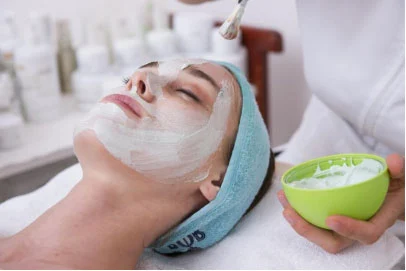5 Tips To Help Prevent Skin Diseases
Don't have time for intensive skincare? No worries, you can still take care
of your skin adequately if you master the fundamentals.
Waking up with sore skin or a huge zit on your nose can be the worst start to your day.
However, the good news is that you can successfully treat and prevent skin issues with good
skincare and a healthy lifestyle.
Here are a few helpful and tried and tested tips to prevent skin issues.
Limit Your Sun Exposure

You probably know that sun's
UV radiation causes multiple skin problems, including discoloration,
age spots, freckles, wrinkles, skin cancer, and many other skin diseases.
One of the best ways to protect your skin against all the dangers of the harmful UV
rays and make it appear fresh and youthful is using skincare products that offer
ultraviolet protection.
Apply
sunscreen every day regardless of whether you're indoors or outdoors. If
you're going to be outside for long, reapply it after every two hours. Use a sunscreen that
has a minimum SPF of 30.
You can also protect your skin from the sun by wearing hats and caps. Long skirts and
long-sleeved clothes also provide protection. And remember to stay indoors between 10 a.m.
and 2 p.m., as the sun is the hottest.
Stay Hydrated

It's critical to drink enough water/fluids for your overall wellness. You must start your
day with herbal tea or warm water for hydration and detoxification. Apart from increasing
your liquid intake, it's equally essential to keep your skin moist for protection.
If your skin is not moist and is on the drier side, your skin's barrier will start breaking.
Gaps will appear, allowing fungus and bacteria to enter through
the microscopic breaches in your skin's protective layer.
Hydrated
skin maintains its flexibility and is less prone to scaling, chapping, or
developing a flaky appearance. Therefore to prevent your skin from getting dry, use a
nourishing moisturizer that suits your skin type.
Hyaluronic acid, ceramides, and coconut oil are all good ingredients to
look for in your moisturizers. Moist your skin and then apply your
moisturizer as it helps secure and lock the hydration of the moisturizer in your skin.
It may sound paradoxical, but long and hot showers strip the natural hydration from your
skin. Therefore limit yourself to five to ten minutes of lukewarm showers. If your skin is
still dry, try reducing the number of baths you take.
You can also invest in a humidifier. Using a humidifier in your office during the day or in
your bedroom at night can help keep the air moisturized, preventing the air from zapping
moisture from your skin.
Take Health Precautions

If your skin bordering the lips is infected, it causes cold sores, while bacteria
can cause acne and
other skin problems. You must be mindful of everything that comes in contact with your
skin to minimize the chances of contracting germs.
You must, at all costs, avoid sharing your personal items such as face cleaning wipes, lip
balms, beauty sponges, and brushes with others. Using each other's facial products is the
leading cause of acne as it transmits germs very rapidly.
Avoid touching your face with your fingers now and then. They carry the most amounts of
germs. Try to avoid facial contact with objects that have been used by others, such as
cellphones. Receive calls on either speaker mode or use ear pods.
If you have splinters or cysts, don't
pick at them, nor should you try various DIYs you find over the web.
Instead, consult your doctor for assistance with these skin problems.
You must also treat any issues with your skin immediately. Whether it's a minor scratch or
an insect bite, consult a professional and apply ointment right away to prevent it from
becoming an unpleasant zit or an unwanted pimple. Clean it regularly and secure it well with
a bandage.
Use Gentle Skin Care Products

Cleaning your face is necessary to eliminate dead cells, germs, oils, and dirt.
However, don't be harsh on the face when washing. Scrubbing your face can
irritate your skin and leave it dehydrated and sensitive.
Avoid over-rubbing, over-scrubbing, and over-peeling your skin, as it will strip off natural
oils and goodness from your skin. Therefore, products that offer harsh and abrasive
exfoliation are a big no for your skin.
Wash your face gently twice a day with a mild
cleanser and warm water. Massage it gently onto your skin in a circular
motion with your fingertips and not your palms to control the pressure you apply on your
face.
Once you've massaged well, rinse thoroughly to remove any debris or soap. Pat dry your
skin with a soft cloth or tissue paper; avoid using harsh paper towels on your face. Seal
off your face-washing routine with a nourishing moisturizer, and voila, you're good to go.
Know Your Skin

Check your skin for changing moles and other symptoms
of probable skin cancer frequently. Consult your dermatologist to
determine which changes should cause you to worry.
Irritated and inflamed dry skin, stubborn acne, persistent skin rashes all require
a visit to the dermatologist. These might be indicating one of the numerous varieties
of dermatitis or other skin problems.
However, if you observe any other skin issues, you should seek medical help right away to
treat them and prevent exposing your skin to danger.
If you’re looking for dermatologists and experienced healthcare physicians, reach out to TelMDCare. We’re a leading virtual healthcare
provider with a team of professional online
doctors who can treat various skin conditions, ranging from eczema to
psoriasis.
We also have experts to help you with allergies, dental infections, sexually
transmitted diseases, ear infections, motion sickness, and many
other health concerns.
Book your virtual healthcare
appointment today for as low as $35. Call us today to learn more about
services!